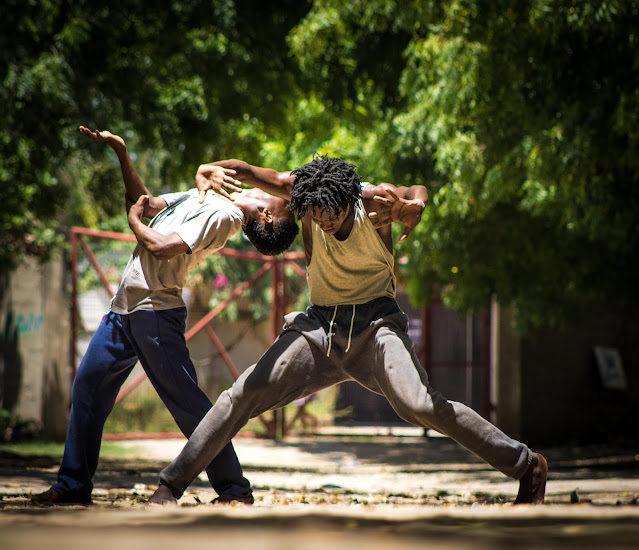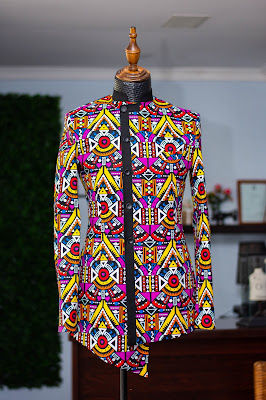By Caroline Uliwa
 |
| Samwel Silas performing, photo by Jimmy Mathias |
When we’re stripped away from the space we call home, the routines that shoulder our intimate moments, where we get to enforce our identity. Who are we and indeed how does one find inner peace when society enforces ‘you belong nowhere in the world’. Surprisingly an ability to accept the now is exactly what Samwel Japhet Silas took “I learned to accept the present moment whatever it brings without judgment;”as his most cherished gift from living on the streets for more than 10 years of his childhood & youth.
Samwel now in his early thirties (he can’t pinpoint his exact age), is a professional dancer and a rising star in the contemporary dance field in Tanzania. To date he has performed on various platforms within the country and mostly abroad in South Korea, South Africa, Uganda, Netherlands, Ethiopia, Rwanda, Senegal, Germany & elsewhere.
 |
| Samwel dancing on the streets of Tanzania, photo captured in a motion picture by Thobias Minzi |
On living on the Streets
“It was a normal day I was given money to go buy groceries; I remember it was exactly 7,500Tshs. I got on a bus went to Mwanza and never looked back.” Samwel recounts the fateful day he left his uncle’s home in Shinyanga and decided to go and live on his own despite being a child with no money and the streets as his destination.
 |
| Samwel embracing the applause after his performance, photo by Zefania Ezekiel |
His grandparents then moved him to his uncle in Shinyanga, it is fair to say there’s a trauma Samwel faced that formed his resolve to leave home and never look back. For when asked why, his eyes travel to a place exposing a vulnerability of someone grappling for a memory they can’t grasp but know is painful. “The one thing I knew was my decision was final, I don’t know exactly why? But I know I truly wished to leave that environment to go far away never to be found by any of them.”
Samwel since then would tour through the most trying of circumstances various regions of Tanzania, getting to Singida from Mwanza, then Dodoma, back to Shinyanga even to the south of the country like Tabora. With two stints in Dar es Salaam a city that would later change the trajectory of his life for good.
 |
| Last year in Kilimanjaro, Tanzania Samwel strikes a pose, photo by Gerald Ochieng |
During this time he shares “You may not believe it but I was happy especially as now I had no one to boss me. Yet as the reality of waking up not knowing where my next meal is, when it rains having to figure right then where to sleep while standing. Grappling with being chased times beaten even arrested by the police, I learned to be grateful and adapt to the moment without lamenting ‘why me’. As already I knew I was on the streets and this is no joy ride.”
 |
| Photo by JAMES Jean-claude |
Samwel recounts his challenges on the streets like having to steal to survive sharing how him and his friends would steal scrap metal, encountering regular chasings and beatings by the ‘maasai’ guards. He also recalls participating in street gambling ‘kamari’ among the less than tasteful things he had to do to survive. At some point a good policeman befriended him in Dar es Salaam giving him transport for him to return to his home in Mara. He recalls using it to go back but when he reached, he could only view the house at night when his family was sleeping. Yet the next day he couldn’t get inside and once again went to Shinyanga resorting to street life until he found his way back to Dar es Salaam.
His Journey with Dance
Already Sam was versed with the charitable deeds of ‘dada’ Nyakwesi Mujaya the executive director of Makini, an NGO that uses art to alleviate the ills encountered by street children in Dar es Salaam. Sam recalls nonchalantly how they were rounded up by Makini and though their agenda of counseling them didn’t really sink in for him. It was the free meals or trips to go swimming at the beach that had him interested.
When he returned to Dar es Salaam he encountered Makini once more and slowly since 2011, began to participate more fully in their programs. “I like exercising and they gave us plenty of that, we would rehearse at the University of Dar es Salaam FPA campus and then go perform at various platforms like the Goethe Institute, Alliance Francais or Nafasi. I learned various art skills as we got to perform through drama plays, drawing, dancing and so on. We would jump on a bus be sponsored with meals and transport for the day and just show up to perform at these art centers in the city.”
 |
| Photo captured in a motion picture by Thobias Minzi |
It was back in 2013 when Sam got on the bus for such a trip to Nafasi Artspace, only unknown to himself he was at an audition. Turns out a new dance school was establishing and on this day they were auditioning for their first batch of students Muda Africa. Sam ended up qualifying from Makini, he was among the two who got a full Scholarship for this three year dance diploma. In 2014 Samwel was then enrolled formally at Muda Africa and the rest as they say is history.
His stint here would see him training for three years graduating in 2016 after receiving a great education. Where he brushed shoulders with the best in the world like choreographer Nora Chipaumire the renowned Zimbawean USA based artivist. Who would light a fire in Sam that allowed him to see how dance gave his life story a voice.
Samwel recalls the first residency he got through the Muda dance program, arriving outside the country for the first time in Kenya after Nyakweso helped him procure a passport. For three months at the GoDown Artcentre KE under the tutelage of Adam Chienjo. He began to see that his pass time stints with Makini were indeed a chance for him to change his life for the better.
Samwel together with his classmate Tadhi Alawi at Muda, established Nantea Dance Company in 2016. He performs under it times inside a group with Tadhi and or Salum Kabasa. Though mostly he works as a solo artist, participating in workshops & residencies worldwide that have solidified his career to ensure his resume reads like that of an international dance star. Here opportunities to study at renowned institutions like Ecole des Sables in Senegal-among Africa’s great dance schools; have placed him at the forefront of his craft in the country.
 |
| Samwel performing outside of Tanzanaia photo by Platonov Arts Festival |
Still the dance profession in Tanzania has many challenges and Samwel advises the government and private sector, to invest more in the craft by providing platforms so as to bust the myths that dance is frivolous.
“Among the reasons many female dancers give up on this craft is the way family perceives dance particularly for us females. I am happy BASATA now has a union of Dancers association but it’s not enough there can be more pressure applied to employers of dancers. So female dancers don’t always have to dangle themselves as ‘meat’ instead of using dance with its various language tools to entertain or edutain their audience” Pili Maguzo TZ, a female professional dancer with over 15 years experience. Pili was among the mentors in Samwel’s journey including Nyakweso, Rachel Kessy, Ian Mwaisunga, Isack Peter and Aloyce Makonde all of whom he credits graciously.
 |
| Tadhi Alawi (left) and Samwel performing photo by Nicholas Calvin |
“This March 20th we’re going to put up a show at the little theatre in Dar called ‘A Moment/Wakati’ featuring me and Samwel. The craft is improving in the country and it’s up to us to elevate the game from our predecessors’ by inviting the public to understand the value of dance.” Tadhi Alawi sheds light on working with Sam on this recent project A Moment/Wakati-Nantea Dance Company and generally the trajectory of this craft if it is to flourish in the country.
In closing our interview Samwel shared how he is always moved when an audience member after his performance would tell him. Your performance got me to see a different perspective on this issue, or because of your dance now I am going to try this and or I feel more inspired. Indeed the leaps and bounds that Samwel makes while performing are a testament from the bellies of our continent that anything is possible; you can learn more on his website samweljaphet.dancer
This article was first published by the East African newspaper in Jan 2021














